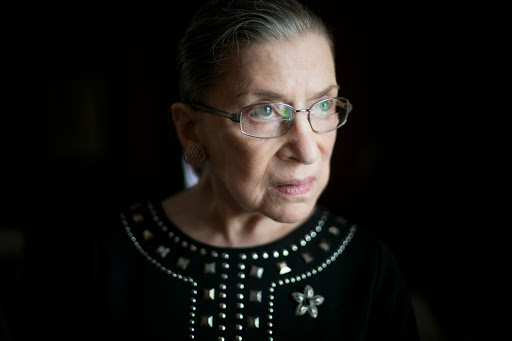Notorious RBG
A dedication to the life of Justice Ruth Bader Ginsburg.

Ruth Joan Bader was born into a low-income Jewish family on March 15, 1933, in Brooklyn, New York. She attended James Madison High School and excelled in her academics. Bader’s mother Cecelia struggled with cancer throughout her childhood and died the day before her graduation. She later graduated from Cornell University in 1954 and graduated first in her class. During this time Bader met Martin D. Ginsburg, a fellow law student, and the two married right after graduating.
Their first daughter, Jane, was born shortly after Martin was stationed at Fort Still, Oklahoma from 1954-1956. Upon Martin’s return, the family moved to Cambridge, Massachusetts where both enrolled in Harvard Law School. Ginsburg learned how to balance her life as a mother and as a law student. She was one of eight women in her class of 500 and became the first female member of the prestigious legal journal, the Harvard Law Review.
In 1980, President Jimmy Carter appointed Ginsburg to the U.S. Court of Appeals for the District of Columbia. She served there until she was appointed by President Bill Clinton in 1993 to serve on the Supreme Court, filling a seat that was vacated by Justice Byron White. Ginsburg was the second female justice, as well as the first Jewish female justice.
Ginsburg became known on the Supreme Court for her strong opinions on gender equality. She wrote the majority decision on the United States v. Virginia case, granting women the right to enlist in the Virginia military. Ginsburg won the American Bar Association’s Thurgood Marshall Award in 1999 for her contributions to gender equality and civil rights.
Despite her age, Ginsburg continued to serve the country, even in the hardest of times. She suffered through five bouts with cancer: colon cancer in 1999, pancreatic cancer in 2009, lung cancer in 2018, pancreatic cancer again in 2019, and liver lesions in 2020. Despite it all, Ginsburg continued to keep up her public image, continuing to win over her conservative justices and fight for equality in every case she saw. After serving on the Court for 27 years, Ginsburg died on September 18, 2020 at the age of 87, due to complications with metastatic pancreatic cancer.
Ginsburg was most notably known for her role in co-founding the Women’s Rights Project at the ACLU as a lawyer in 1972. WRP empowers and supports women that have been subject to gender bias and gender discrimination.
In 1996, Ginsburg wrote the majority opinion on the United States v. Virginia case, stating that it is unconstitutional for schools that are funded by taxpayers to discriminate against women. Institutions would no longer be able to exclude women because of their gender.
Before Ginsburg, women couldn’t sign a mortgage or have a bank account without a male co-signer. In 1974, she started the Equal Credit Opportunity Act, which would allow for women to apply for credit cards and mortgages without a male co-signer.
Ginsburg was a crucial vote in the decision to keep Roe v. Wade. This decision continued to let women have the right to choose to have an abortion without government restriction. Ginsburg also pushed to protect women in the workplace. She argued that excluding a woman from a field of work was sex discrimination.

Hello! My name is Grace Allen, I am a senior and managing editor of this year's newspaper! I have played clarinet in band for the past three years and...












